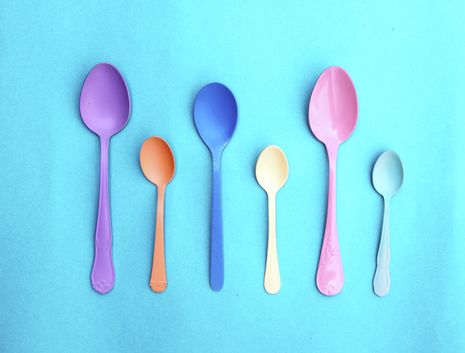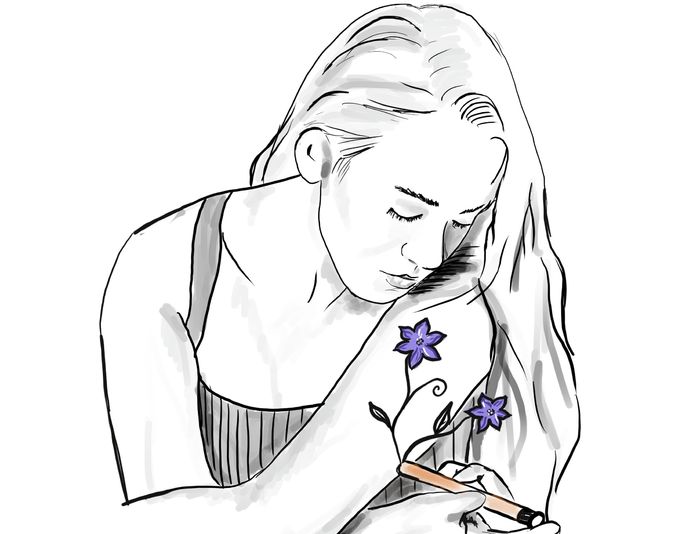Spoons (not the pub)
Eleanor Medcalf discusses the poeticism and significance of Christine Miserando’s ‘spoon theory’ for sufferers of chronic illness

I would like to write about spoons (not the pub). Spoon theory came to be about spoons because Christine Miserandino, blogger and lupus patient advocate, happened to be in a diner when she looked for props to explain her experience of chronic illness. Let’s set the scene. Her friend asked her: '"What’s it really like to live with lupus?"' She looked around for something which she could use to represent finite energy resources and, I imagine, her eyes lighted upon the cutlery basket. She grabbed all the spoons and began to explain.
For anyone who’s new to spoon theory, I’d recommend reading the full account on Miserandino’s blog, but I’ll summarise. Miserandino suggested that a day in the life of a chronically ill person is like having twelve spoons which you 'spend' to complete any task: basic tasks like getting out of bed cost one spoon but more complex things like going to work or cooking a meal can cost several. Once you’re out, you’re out: you can’t do anything more in the day. It’s a way of assigning tangible value and consequences to explain the effects of illnesses that are so often invisible.
“The spoon does feel like the natural choice, somehow. Is it something in its form — more abstract, more seductive, more predisposed to symbolism?”
But why spoons? They were in a diner; she could have just as easily grabbed the knives or forks. Maybe there were none to hand, or maybe the spoon and its curved back happened to catch the light? It must have been something more: after all, the spoon does feel like the natural choice, somehow. Is it something in its form — more abstract, more seductive, more predisposed to symbolism? It certainly stands alone where the others are bitterly co-dependent and is perhaps less prescriptive where those two are functional. Well, yes, of course, they’re all functional, but the spoon’s function lies in its suitability to the human gulp: it’s measured for the satisfaction of consuming, whereas knife and fork are more concerned with the necessity of spearing and ripping apart.
So, she picked out the spoons. But say the spoons were not in a basket at all, rather, they were inconveniently scattered across many table settings. Say, as one does in a diner, they’d just ordered a meal and had the leftover change in their pockets. Why not use coins or even chips, then? Would they not be preferable as an analogy for any kind of finite resource? (Never mind the crucial factor that edible examples are always preferable.)
But the spoon prevails, even when more appropriate metaphors exist, precisely because it feels jarring. A spoon is a tool that can be reused infinitely and to treat it as a finite resource feels wasteful. There is a tragedy in the oxymoron of a “spent spoon.” Chronic, especially invisible, illness feels the same. Whilst it can be managed, as logically and diligently as spoon-distribution, it will always defy logic, especially the logic of a soul which is inclined to action, a heart which craves more and a mind with all the determination to get it.
“There is a tragedy in the oxymoron of a ‘spent spoon.’ Chronic, especially invisible, illness feels the same”
Eight months ago today I got a migraine which never went away, and if I’ve learnt anything from my experience of chronic pain and seeking help for it, it’s that you will very quickly meet people who have suffered and struggled and persevered and had their lives altered far more than you and yours have been. And yet, these are nearly always the people most willing to put in the time and effort (and spoons!) to advise and help you. Whilst I am full of gratitude to everyone who has taken the time to advise me and share their own experiences, it is easy to feel like a bit of a fraud in these encounters. Before writing this, I wondered seriously whether I was even entitled to share spoon theory since, though it resonated with me to a tee, its originator suffers from a chronic illness far more debilitating than my own. I have come to see that this approach is ludicrous: ideas and analogies aren’t finite resources; they should be shared and used wherever they can be helpful. And downgrading my own experiences won’t serve anybody. I realised that I had to share spoon theory when this illogical guilt at doing so persisted. Spoon theory doesn’t just apply to chronic pain, fatigue and physical illness, it applies to mental health conditions which can be even less tangible and therefore easier to downgrade subconsciously. If I felt like a spoon-imposter, I could only imagine how difficult it must be for someone struggling with depression.
I hope you will forgive this rambling survey of the 'spoon.' It was written because I am fed up with how invisible and exhausting pain can be and wanted to luxuriate in the spoon’s physical existence and tangible reality. To conclude, I hope that no one is ever made to feel that they are not entitled to share in this metaphor if it is helpful to them, no matter how 'serious' or visible their condition is. But I would be lying if I claimed that my only mission in writing this was to help others. The truth is that I’ve never wanted to complain less in my life (after all there’s nothing complex about 'my head is still hurting' and it gets boring) but we all want to be understood, and often in the past eight months I’ve wanted and needed to say, in a way that isn’t at all pitiful or in any way emotionally charged: 'I’ve run out of spoons.'
 News / Caius mourns its tree-mendous loss23 December 2025
News / Caius mourns its tree-mendous loss23 December 2025 News / Clare Hall spent over £500k opposing busway 24 December 2025
News / Clare Hall spent over £500k opposing busway 24 December 2025 Comment / Yes, I’m brown – but I have more important things to say22 December 2025
Comment / Yes, I’m brown – but I have more important things to say22 December 2025 Comment / The ‘class’ of Cambridge24 December 2025
Comment / The ‘class’ of Cambridge24 December 2025 Interviews / Politics, your own way: Tilly Middlehurst on speaking out21 December 2025
Interviews / Politics, your own way: Tilly Middlehurst on speaking out21 December 2025








